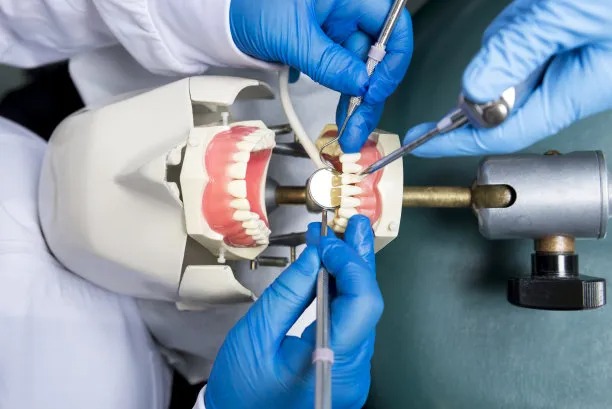Summary: Dental implantation is a significant procedure that demands thorough preparation and understanding of certain precautions to ensure successful outcomes and an efficient recovery period. This article discusses essential factors one must consider before undergoing dental implants. These include assessing one’s health status, choosing a qualified dental professional, understanding post-operative care requirements, and recognizing the potential risks involved. By being well-informed about these aspects, patients can enhance their chances of successful implantation and minimize complications during their recovery process.
1. Assessing Your Health Status

Before proceeding with dental implants, it is critical to evaluate your overall health. Certain health conditions can interfere with the healing process and affect the success of the implant. For instance, individuals with uncontrolled diabetes may face complications in wound healing, which could hinder the integration of the implant with the jawbone.
Additionally, smoking can significantly impact your healing process. It narrows blood vessels and can slow down the healing of the gums and tissues in the mouth. Thus, its advisable to quit smoking at least a few weeks before the procedure and continue for the duration of the healing period.
Furthermore, a detailed medical history should be discussed with your dentist, including medications and supplements. Some medications, like blood thinners, can present additional challenges during and after the implantation process, so it’s vital to have a tailored approach based on individual health needs.
2. Choosing a Qualified Dental Professional
Selecting the right dental professional to perform the implant surgery is paramount for success. Dentist qualifications and experience can significantly affect the outcome of the procedure. It is essential to look for a dentist or oral surgeon with specialized training in dental implants and a track record of successful surgeries.
Consultations should not just focus on the cost of the procedure, but also on the level of expertise and the technology used in the office. Advanced imaging technologies, such as 3D scans, can help in precise planning of the implant placement, which is essential for optimal results.
Don’t hesitate to ask for before-and-after photos of previous patients and seek testimonials or reviews. A good practitioner will be happy to share their success stories, which can give potential patients greater confidence in their choice.
3. Understanding Post-Operative Care Requirements
Post-operative care is vital in ensuring the success of dental implants. Patients must follow their dental professionals guidelines closely after the procedure. This includes specific instructions regarding oral hygiene, diet, and any medications prescribed.
Dietary restrictions can help avoid complications. Hard, crunchy, or sticky foods should be avoided for a period to prevent any undue stress on the healing implant. Consuming soft foods and staying hydrated will aid in recovery.
Maintaining proper oral hygiene is another crucial aspect of post-operative care. Following the surgery, your dentist may recommend using a special mouth rinse to reduce the risk of infection. Regular follow-ups are also essential to monitor healing and ensure that the implant is integrating properly with the bone.
4. Recognizing Potential Risks Involved
While dental implants are generally safe, understanding the potential risks helps in making an informed decision. Some common complications include infections, nerve damage, and issues with the implant fitting properly. Recognizing the signs of these problems promptly can make a difference in managing them effectively.
Patients should also be aware of the possibility of implant rejection. Though it is rare, some individuals bodies may not accept the foreign material, leading to implant failure. Informing your dental professional of any unusual symptoms should be immediately addressed.
Lastly, understanding that implants can sometimes require additional procedures, like bone grafts or sinus lifts, is crucial. These procedures are sometimes necessary to create a sturdy foundation for the implant, so being prepared for this may ease potential anxieties during the process.
Summary:
The considerations discussed are pivotal for anyone thinking about dental implantation. A thorough understanding of health assessments, the importance of selecting a qualified dental professional, adhering to post-operative care, and recognizing risks can enhance the likelihood of successful outcomes and smoother recovery periods. By taking these precautions seriously, patients can invest in a procedure that significantly improves their quality of life.
This article is compiled by Vickong Dental and the content is for reference only.
Vickong Dental
Vickong Dental is a large medical group established in Hong Kong in 2008 by professors from well-known medical universities in Guangdong and Hong Kong, as well as medical doctors from key national '985' universities (including Master's supervisors and senior professors). The chain of branches brings together expert dentists with PhDs and Master's degrees from Hong Kong and Mainland China, committed to providing high-quality dental treatment.
"Vickong Dental Practices the University Motto of 'Healing and Serving Society,' with a Stable Operation for Sixteen Years. It Has Been honored with Hong Kong Enterprise Leaders's Choice,' and is a Global Trusted Implant Center for the Nobel Implant System. Recommended by Hong Kong Metro Broadcast and Guangdong Television, it Serves Customers from Over Thirty Countries and Regions, Gaining the Trust and Favor of Citizens from the Guangdong-Hong Kong-Macau Greater Bay Area and Surrounding Cities.

Thousands of customers' unanimous praise
The most recognized and highly recommended dental service by customers in the Guangdong-Hong Kong-Macau Greater Bay Area
We Ensure You Receive Detailed Care and Attention Here
Hong Kong standards, Shenzhen prices, Your Trusted English-speaking dentists

Vickong Dental Medical-Grade Instrument Disinfection Process
Vickong Dental Medical-Grade Instrument Disinfection Process

Vickong Dental Chain: A Warm and Comfortable Environment for Treatment






Appointment Hours

Q&A
Why choose Vickong Dental?
Vickong Dental practices the university motto 「Medicine to Benefit Society」, with each branch bringing together highly qualified dentists with doctoral and master’s degrees from Hong Kong and the Mainland, and has maintained seventeen years of steady operation。Recipient of 「2024 Hong Kong Enterprise Leaders Brand」, 「2025 Hong Kong Enterprise Leaders Brand」, a Nobel Biocare Global Trusted Implant Center, and a brand recommended by Metro Radio Hong Kong and Guangdong TV。
To date, we have served customers from more than thirty countries and regions,earning exceptionally high word-of-mouth recognition and trusted recommendations from residents across the Guangdong-Hong Kong-Macao Greater Bay Area and surrounding cities
We have eight major branches in Zhuhai、Shenzhen,and a consultation and service assurance center in Hong Kong,so you can book a free consultation at any time for any questions,which is very reassuring.
If I do not accept the quotation after the CT scan, will I be charged??
No! As long as the actual treatment has not started, you will not be charged any fees.
Will there be any additional charges during the treatment process?
No, there won’t be any additional charges. Before treatment begins, we will clearly explain the treatment plan and its corresponding fees. Only after the patient agrees and signs the consent form will we proceed with the dental service.
Can I pay in Hong Kong dollars?
Yes. Vickong Dental accepts payment in Hong Kong dollars. The amount will be converted based on the exchange rate of the day, and the applicable rate will be clearly communicated to you in advance.
Can I reschedule my appointment at any time?
Yes. Please contact us via **WeChat** or **WhatsApp** as early as possible, providing your original appointment time and details, along with your preferred new date and time slot for rescheduling.













